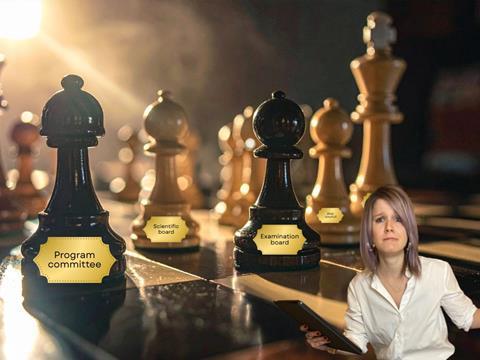
As early-career researchers progress in their careers, they are often invited to join committees, boards, or associations — but are these roles truly beneficial or just another drain on time and energy? Isabelle Kohler explores the diverse types of academic committees, the skills and impact they can bring, and how to strategically decide which opportunities are worth accepting.
This month, we officially dissolved the association we founded to organize the International Mass Spectrometry Conference in 2022 in Maastricht. While closing that chapter, I found myself reflecting on the number of committees and association boards that academics join throughout their careers – and why we say yes to them in the first place.
When I was a PhD student, I had no idea about the diversity of tasks that professors handle. Only later, while climbing the academic ladder, did I realize how much time goes into non-scientific activities. Among those, being part of committees and boards has become one of the major components of my academic job.
Academic researchers can be invited to join a wide range of committees, boards, and associations that differ in purpose and scope. Broadly, they fall into a few main categories.
- Education and academic governance: program committees, examination boards, and faculty councils focused on teaching and curriculum design.
- Scientific and research advancement: editorial boards, conference organizing committees, or funding review panels that shape the research landscape.
- Institutional and policy development: DEI, sustainability, or PhD councils that influence how universities operate.
- Professional and external engagement: scientific societies, advisory boards, or evaluation roles in industry, NGOs, and governmental agencies.
- Innovation and outreach: valorization and science communication committees connecting academia with the wider public.
Together, these activities show how academic expertise extends far beyond teaching and research, influencing policy, education, and society at large.
That impact is one of the main reasons to join a committee: we get the chance to make a difference – for fellow scientists, students, or the broader community. But committee work offers more than impact. It’s an excellent environment to hone professional skills. In my case, I’ve often served as Secretary, a role that suited my efficiency and organizational strengths. Committee work strengthens leadership, communication, and teamwork – skills that are valuable in any career path.
Another benefit is the insider perspective it provides. Thanks to my involvement in university committees such as the examination board, I understand much better how academic systems function. It’s also a powerful way to expand one’s network, whether within the institution or with external partners from policy, industry, or beyond.
Still, every new committee means more meetings, more emails, and more deadlines. I’ve consistently underestimated how much time each new role would demand. As early-career researchers, we often feel flattered or validated when invited to join a committee, and it can feel impossible to say no. Yet, saying yes too often easily leads to overload.
How can we be more strategic about these decisions?
- Evaluate before accepting. Take time to estimate the workload and expected duration. Talk to current or former members to understand the atmosphere and expectations.
- Play to your strengths. Choose roles that match your interests and talents. If finances bore you, don’t volunteer as treasurer—unless you truly want the challenge.
- Remember that timing matters. You don’t need to accept every opportunity. Sometimes, focusing on your PhD or a grant proposal takes priority. Professional careers are long; there will always be future chances to contribute.
Over the past decade, I’ve been a part of several professional associations, where I could contribute to the community by organizing conferences, communicating with members, and maintaining association websites. Today, I dedicate more energy to university committees, aiming to reshape the system from within. That’s where my efforts feel most meaningful right now.
Ultimately, committee work can be either a strategic move or a waste of time – it all depends on how intentionally we choose where to invest our energy.
If you are interested in learning more about how to navigate academia and all the possible committees you can join, do not hesitate to join the NextMinds Community! For this, you have plenty of choices: visit NextMinds website to learn more about my work, sign up for the newsletter, and follow me and NextMinds on LinkedIn.

















Nog geen opmerkingen